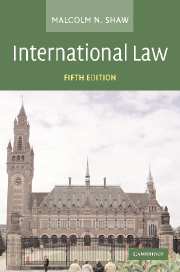Book contents
- Frontmatter
- Contents
- Preface
- Table of cases
- Table of treaties and selected other international instruments
- List of abbreviations
- 1 The nature and development of international law
- 2 International law today
- 3 Sources
- 4 International law and municipal law
- 5 The subjects of international law
- 6 The international protection of human rights
- 7 The regional protection of human rights
- 8 Recognition
- 9 Territory
- 10 Air law and space law
- 11 The law of the sea
- 12 Jurisdiction
- 13 Immunities from jurisdiction
- 14 State responsibility
- 15 International environmental law
- 16 The law of treaties
- 17 State succession
- 18 The settlement of disputes by peaceful means
- 19 Inter-state courts and tribunals
- 20 International law and the use of force by states
- 21 International humanitarian law
- 22 The United Nations
- 23 International institutions
- Some useful international law websites
- Index
- References
21 - International humanitarian law
- Frontmatter
- Contents
- Preface
- Table of cases
- Table of treaties and selected other international instruments
- List of abbreviations
- 1 The nature and development of international law
- 2 International law today
- 3 Sources
- 4 International law and municipal law
- 5 The subjects of international law
- 6 The international protection of human rights
- 7 The regional protection of human rights
- 8 Recognition
- 9 Territory
- 10 Air law and space law
- 11 The law of the sea
- 12 Jurisdiction
- 13 Immunities from jurisdiction
- 14 State responsibility
- 15 International environmental law
- 16 The law of treaties
- 17 State succession
- 18 The settlement of disputes by peaceful means
- 19 Inter-state courts and tribunals
- 20 International law and the use of force by states
- 21 International humanitarian law
- 22 The United Nations
- 23 International institutions
- Some useful international law websites
- Index
- References
Summary
In addition to prescribing laws governing resort to force (jus ad bellum), international law also seeks to regulate the conduct of hostilities (jus in bello). These principles cover, for example, the treatment of prisoners of war, civilians in occupied territory, sick and wounded personnel, prohibited methods of warfare and human rights in situations of conflict.
Development
The law in this area developed from the middle of the nineteenth century. In 1864, as a result of the pioneering work of Henry Dunant, who had been appalled by the brutality of the battle of Solferino five years earlier, the Geneva Convention for the Amelioration of the Condition of the Wounded in Armies in the Field was adopted. This brief instrument was revised in 1906. In 1868 the Declaration of St Petersburg prohibited the use of small explosive or incendiary projectiles. The laws of war were codified at the Hague Conferences of 1899 and 1907.
A series of conventions were adopted at these conferences concerning land and naval warfare, which still form the basis of the existing rules. It was emphasised that belligerents remained subject to the law of nations and the use of force against undefended villages and towns was forbidden. It defined those entitled to belligerent status and dealt with the measures to be taken as regards occupied territory. There were also provisions concerning the rights and duties of neutral states and persons in case of war, and an emphatic prohibition on the employment of ‘arms, projectiles or material calculated to cause unnecessary suffering’.
- Type
- Chapter
- Information
- International Law , pp. 1054 - 1081Publisher: Cambridge University PressPrint publication year: 2003



